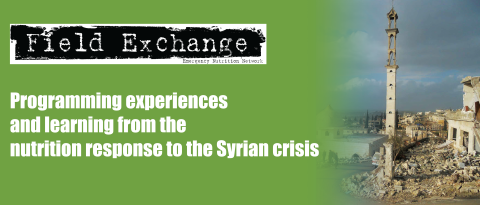Women’s protection and empowerment programming for Syrian refugees in urban Jordan: challenges and lesson learned
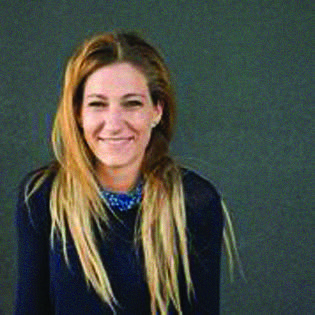 By Melanie Megevand, IRC
By Melanie Megevand, IRC
Melanie Megevand is IRC’s Women’s Protection and Empowerment Programme Advisor, and has worked in Jordan since May 2012. She established the IRC's emergency response for Syrian refugees in Jordan which include child protection services, reproductive health services and women’s protection and empowerment programmes. She has worked in emergency child protection and GBV programming in Africa, the Middle East and the Haiti for the past 8 years.
First and foremost, the author extends heartfelt thanks to the Syrian women and girls who have spoken here and trusted IRC with their stories. Their experiences, strength and resourcefulness reflect they are much more than victims of violence but are the cornerstone of families, communities and societies. She has profound respect and admiration for her IRC WPE colleagues and volunteers, IRC partners and counterparts, for their dedication in this immensely challenging area of work.
All the names of those quoted in this report have been changed to protect their identity, unless otherwise consented.
“We ask for humanity—for people to treat us like human beings.” Nada, age 35, Jordan
Background
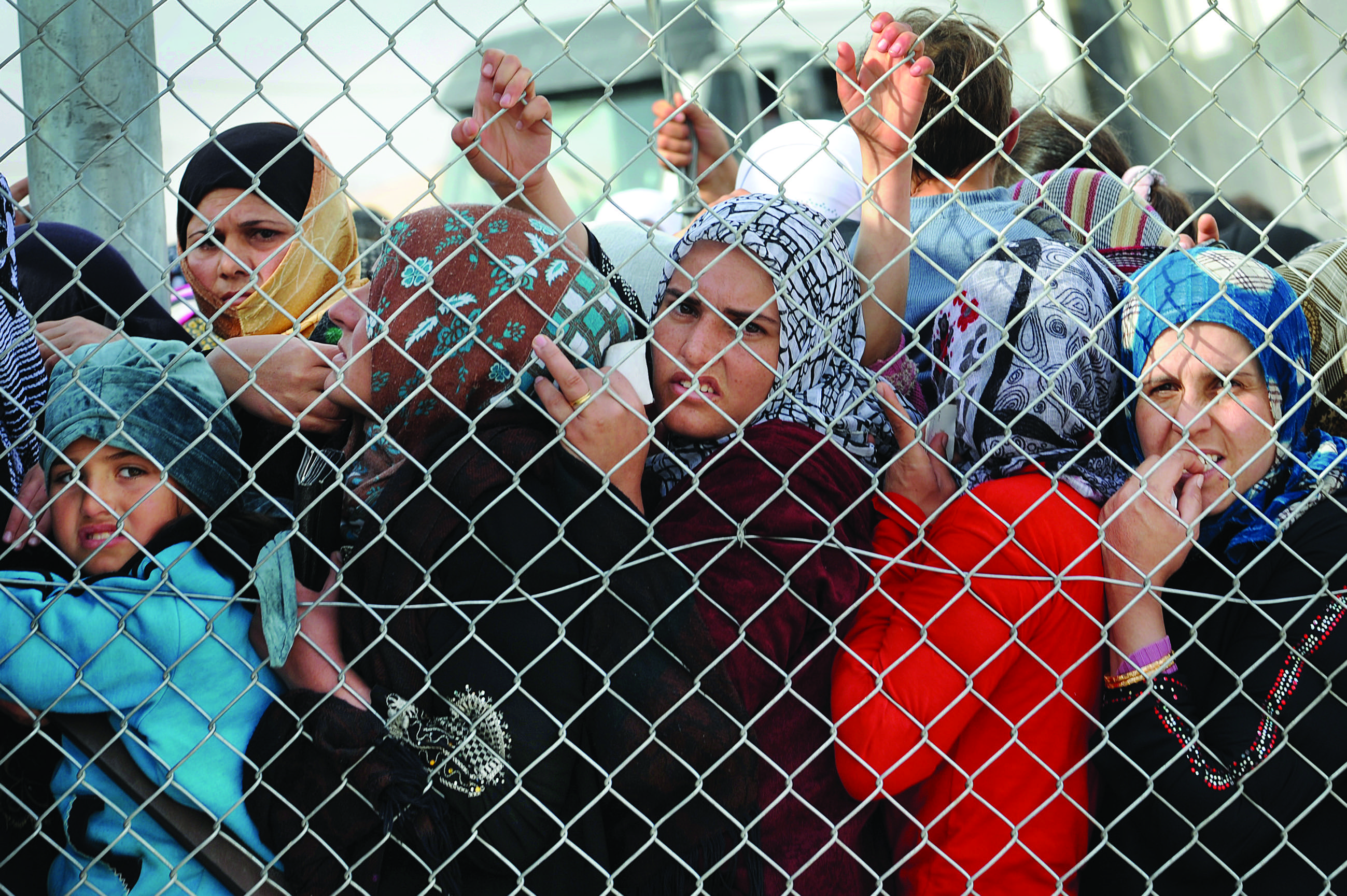 The IRC has implemented Women’s Protection and Empowerment (WPE) programmes in Jordan since 2007 as part of its emergency response services to Iraqi refugees. Over the years this transitioned from direct programming to supporting community based organizations (CBOs) to deliver services and longer term capacity building efforts with government institutions around Gender Based Violence (GBV). However, in the spring of 2012 IRC’s partners became quickly overwhelmed with the pressing and growing needs of Syrian women and girls pouring into the country at which point the IRC re-established its direct response in parallel to continued support to partners. Almost four years into the conflict, nearly four of every five people who have fled Syria in the past three years have been women and children.
The IRC has implemented Women’s Protection and Empowerment (WPE) programmes in Jordan since 2007 as part of its emergency response services to Iraqi refugees. Over the years this transitioned from direct programming to supporting community based organizations (CBOs) to deliver services and longer term capacity building efforts with government institutions around Gender Based Violence (GBV). However, in the spring of 2012 IRC’s partners became quickly overwhelmed with the pressing and growing needs of Syrian women and girls pouring into the country at which point the IRC re-established its direct response in parallel to continued support to partners. Almost four years into the conflict, nearly four of every five people who have fled Syria in the past three years have been women and children.
In the course of rapid GBV assessments conducted in mid-2012 in Jordan and Lebanon by the IRC, Syrians expressed profound distress over the loss of everything that had made their previous lives normal. Systematic accounts of women and girls being attacked in public or in their homes in front of family members, accompanied by attacks in which women and girls were kidnapped, raped, tortured and killed, has left not only visible physical wounds but profound emotional and psychological scars on both survivors and Syrians at large. Conversations with hundreds of Syrian women and girls, men and boys throughout the region from May to June 2014 supplemented by interactions with thousands of women and girls since the Syrian crisis began within Jordan, Lebanon, Syria, Iraq, and Turkey, where the IRC works underline and substantiate the findings of 2012. When asked “what are the biggest challenges you are facing”, Syrian women and girls reveal three overarching themes of shared experiences with regard to the nature and regularity of the violence they face simply because they are female: the impact GBV has on accessing any and all aid; the complex interplay between the multiple daily threats to their safety and psychosocial wellbeing, and the tremendous adversity they face in their intimate circle, community and society at large.
Impact of GBV on access to aid by women and girls
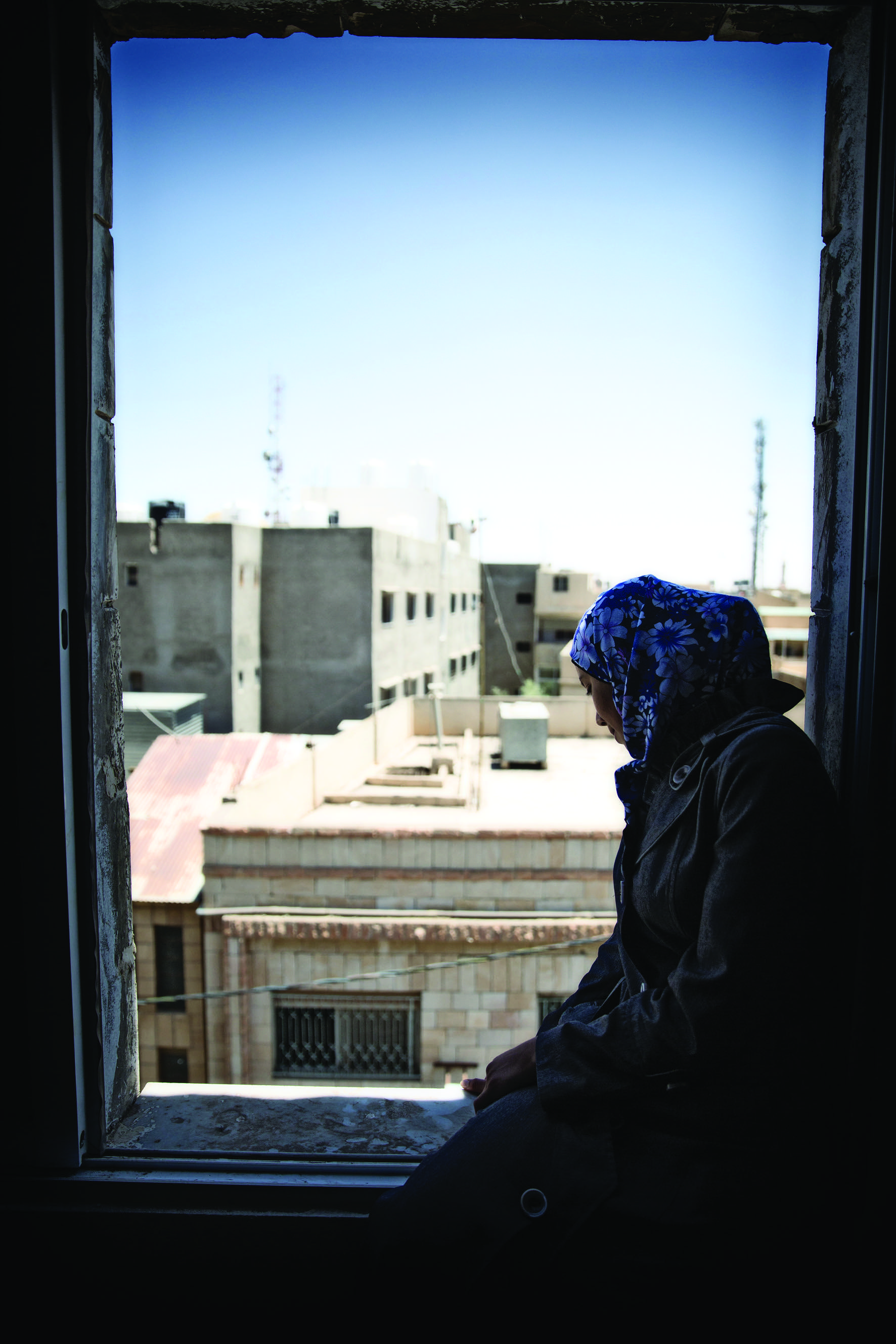 First, the daily reality of sexual exploitation and extreme levels of harassment creates an environment in which Syrian women and girls reveal being constantly fearful walking to school, the store, the latrine, or anywhere else to access services, detailing how each exposes them to threats of harassment and assault. Women and adolescent girls speak of feeling exhausted by the daily negotiations for physical and sexual safety to secure food and water, shelter and clothing. Women and adolescent girls told the IRC about being sexually harassed and exploited by individuals charged with delivering humanitarian aid or by those in positions of relative economic and/or political power in their own communities. They report being asked to engage in “special friendships,” sex, and marriage, by leaders in camps, staff in CBOs, religious leaders, community leaders, employers, and others. Outside camps in urban areas, where refugees are spread out, restrictions on mobility limit women and girls’ ability to access goods and services provided by the government and/or humanitarian organisations.
First, the daily reality of sexual exploitation and extreme levels of harassment creates an environment in which Syrian women and girls reveal being constantly fearful walking to school, the store, the latrine, or anywhere else to access services, detailing how each exposes them to threats of harassment and assault. Women and adolescent girls speak of feeling exhausted by the daily negotiations for physical and sexual safety to secure food and water, shelter and clothing. Women and adolescent girls told the IRC about being sexually harassed and exploited by individuals charged with delivering humanitarian aid or by those in positions of relative economic and/or political power in their own communities. They report being asked to engage in “special friendships,” sex, and marriage, by leaders in camps, staff in CBOs, religious leaders, community leaders, employers, and others. Outside camps in urban areas, where refugees are spread out, restrictions on mobility limit women and girls’ ability to access goods and services provided by the government and/or humanitarian organisations.
The psychological, physical, and economic consequences of this harassment are not always visible. Psychological consequences, such as shame, settles deep into the women’s and girls’ consciousness. Economic opportunities are lost because women and adolescent girls must curtail activities outside the home to protect themselves from additional abuse. As the international community fails to ensure that all services take into account the specific needs and challenges women and girls face in accessing services, they have developed coping mechanisms responding to harassment by changing their behaviour, opting to stay home instead of leaving their house or tent, further disenfranchising them from access to services. While freedom of mobility was somewhat limited for many women and girls prior to displacement, they are unanimous in saying that increased fear of sexual assault and harassment has placed even further restrictions on displaced women and girls as traditional norms place a heavy and potentially dangerous responsibility for family honour on women and girls. Men and boys we spoke with concur, explaining that they are raised with the understanding that it is their duty to defend the honour of their families even when it can result in severe and fatal repercussions for women and girls, as the mere suggestion of impugning that honour permits men to commit so-called honour crimes. A recent report commissioned by UNHCR which surveyed 135 female heads of households taking refuge in Egypt, Jordan, and Lebanon showed that approximately half of the women interviewed left the house less in their host country than when they were living in Syria1. Women reported feeling isolated and imprisoned in their own homes2. Further, 60% of women expressed feelings of insecurity, and one in three women stated that they felt too scared or overwhelmed to leave their homes at all3.
The vast majority of women and girls are reluctant to seek help when harassed, fearing for their safety or the safety of their families, as well as possible deportation or retaliation by their host community. For those abused by landlords or employers, their greatest fear was losing their income or their home. As a response to these threats, their world becomes smaller and lonelier, but not necessarily safer.
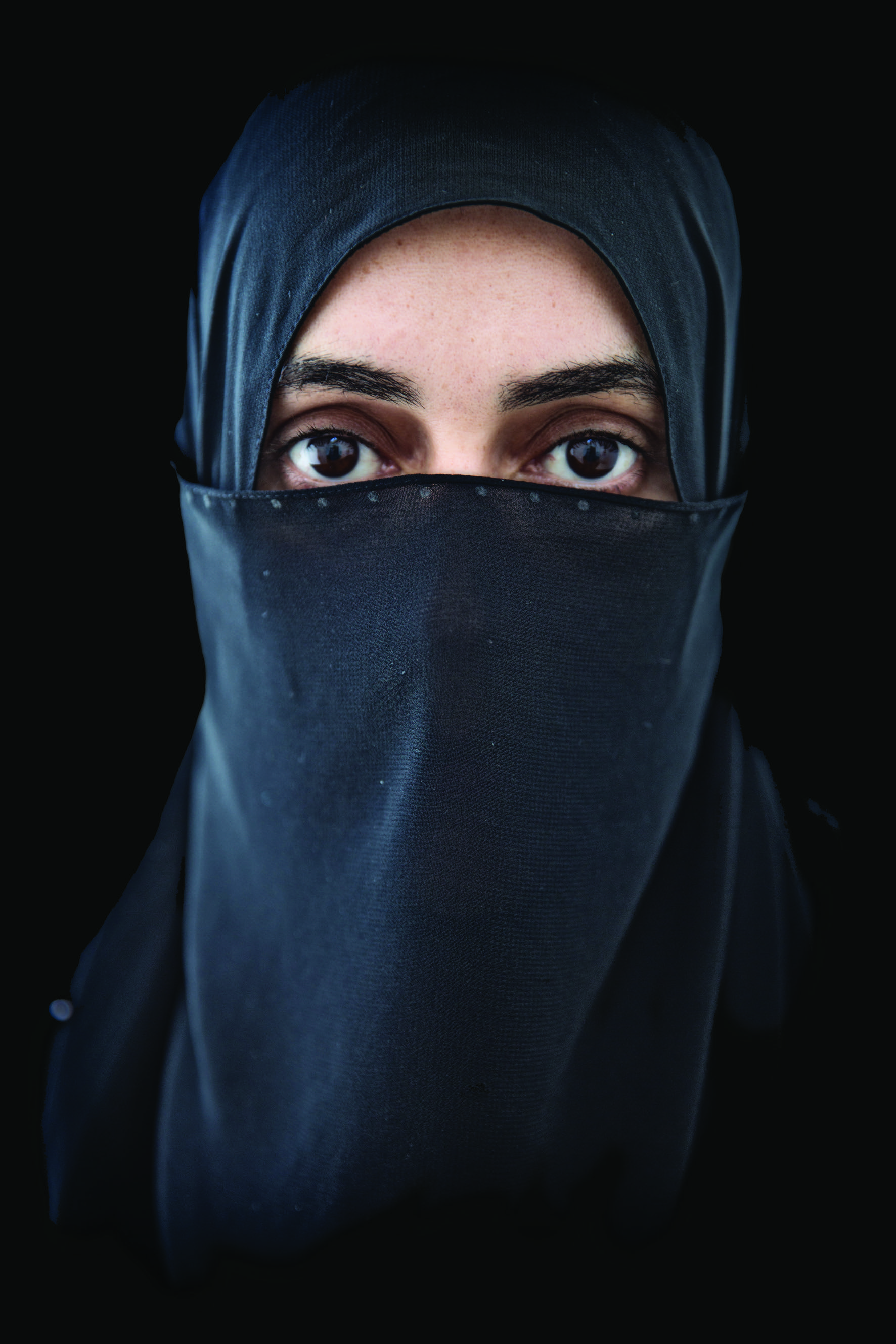 Zaeemah, age 34, Jordan
Zaeemah, age 34, Jordan
“I want my voice to be heard everywhere – so that everyone can feel with us.”
In late 2013, I fled Syria after my husband was briefly detained. In Jordan, our once loving relationship quickly grew tense and my husband became more violent. It is illegal for him to work and growing frustrated with his inability to provide for their family, he began hitting me and our children. I’ve lost all respect for him because of how he treats our children. I have so much love for my children – they have missed out on a lot of things, and I blame him for not being able to help them and not treating them well. When he is hitting me or them I just cry a lot - I try not to, but I do. “Despite taking contraceptives, I recently learned that I am pregnant. I feel suffocated. My husband can’t handle any more kids. We both felt that we did not want to have another child with each other. I’ve tried to get an abortion, but here it isn’t allowed. I see similar situations happening with my neighbours and relatives. I still have hope – every moment I feel guilty that I can’t help my husband and I know deep down I still love him, but for now…the world is dark.”
Domestic violence
Second, women and girls shared with us that their homes are not places of refuge and they speak of increased incidents of domestic violence. Indeed, over the past year in both Jordan and Lebanon, more than 70% of violent incidents reported to IRC WPE staff happened in refugees’ homes. Of those incidents, 80% were perpetrated by an intimate partner or someone known to the victim4. Women and adolescent girls share with us their perception of increased physical and emotional violence from their husbands since fleeing Syria attributing this “yelling and beating” as men’s way of coping with the stress of trauma and of being a refugee. One woman told the IRC:
“My husband beats me, and I think this stems from a psychological problem…he is relieving the stress because he is beating me.” Mona, age 21, Lebanon.
Other women speak about the lack of employment opportunities available for their husbands, resulting in their inability to fulfil their traditional role as the family provider:
“Men are becoming angry—they can’t provide for their family. My husband wasn’t a smoker—now he is. He is extremely irritated all the time and takes it out on the kids. He is violent towards the kids; he is violent towards me.” Farah, age 38, Jordan.
Others perceive causes of the increased physical and emotional abuse due to the fact that
“when a woman goes out to do the shopping or get coupons, he isn’t grateful. No, he is the opposite. He gets angrier, making comments like: “You didn’t cook; you didn’t work today. His anger increases.” –Haifa, age 41, Jordan.
Women also mention other refugee realities: men being frustrated by the lack of privacy to engage in sexual relations with their wives, a sense of hopelessness regarding the future, and constant concern over meeting basic needs for the household (i.e., rent, food, water, shelter, clothing, and health care costs). One woman noted:
“I have to think with my husband how to pay the rent…we are always fighting, especially because of these living conditions.” Samira, Age 19, Turkey.
The physical and emotional toll of this violence on women and adolescent girls impacts every aspect of their lives keeping them isolated, afraid and dependent on those who abuse them. Despite the stark impact of domestic violence, the humanitarian community has been reluctant to address it, seeing such violence as a private matter outside the scope of traditional aid mandates. This hesitancy must stop. Aid is systematically organized and filtered through heads of households (who are almost always male). Yet women and girls repeatedly disclose incidents of domestic violence citing leverage and control of access to services as part of their abusers’ tactics.
Women need programmes that confront this reality. This in turn requires a change in both the scale of programming and the approaches being used. On-going domestic violence cannot be addressed by programmes that treat violence against women and girls as a one-time occurrence, with discrete one-off interventions to heal wounds or prosecute perpetrators. All sectors of aid must take stock of the hostile dynamics that fuel domestic violence when aid remains head of household centric.
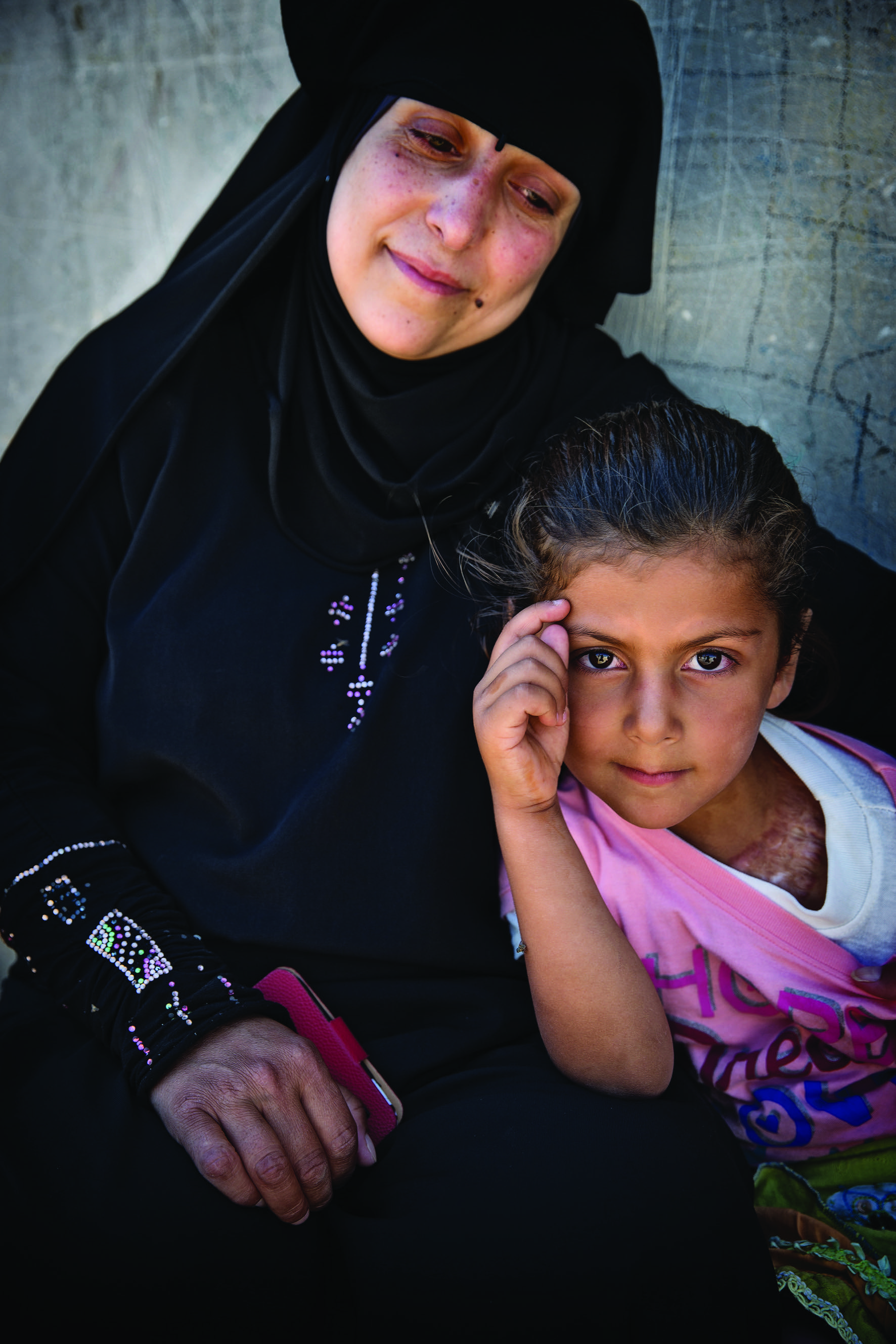 Early and forced marriages
Early and forced marriages
Third, Syrian women and girls talk about early and forced marriage in the specific context of conflict, displacement and dwindling resources. While acknowledging that early marriage is a customary practice in Syria, Syrian adolescent girls explain that the way in which marriage is carried out has changed since the conflict as they are forced to marry at younger ages, marrying men who in other circumstances would not have been considered suitable, are exposed to more violence in and out of the home, and find it increasingly difficult to access services such as healthcare and education once married.
“In my case, I got married really young [at 13]. It’s very hard for me to get pregnant. It was really hard to get a child; I had 5 miscarriages. I am now in debt because I paid for the injection to get pregnant. … My husband wants to divorce me.” —Zain, age 18, Lebanon.
Fear for refugee girls’ safety exacerbated by overcrowding in homes and tents, financial considerations, and questions parents and girls have about the utility of girls attending school in the host country strongly influence the justification for early marriage. Women and adolescent girls, and in some cases men as well, said if there were other options available, these early and forced marriages would not take place or at least be delayed.
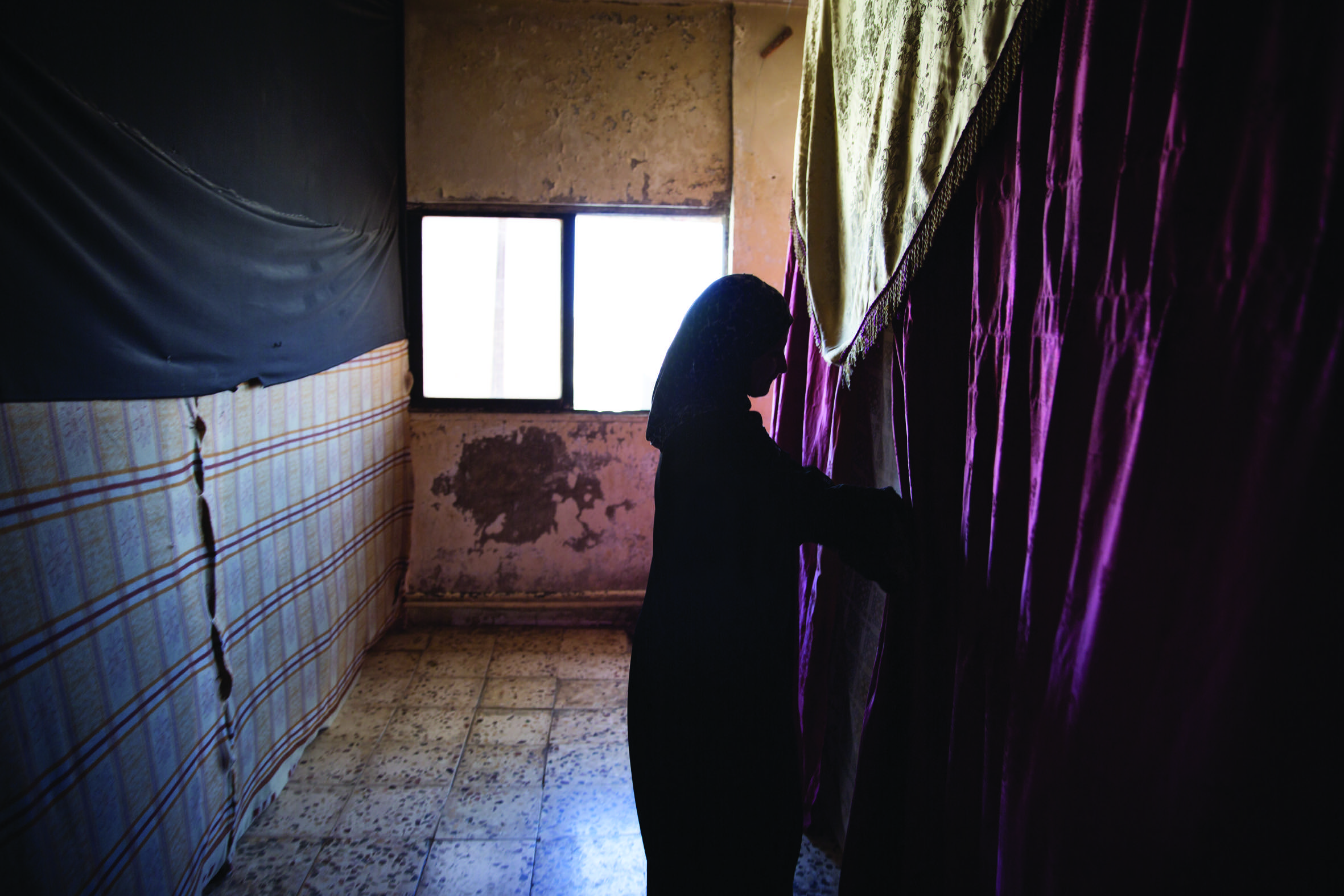 Sabeen, age 15, Lebanon
Sabeen, age 15, Lebanon
One day I came home to my father arguing with my mother, saying it was time for me to get married. He wanted to arrange a match with my cousin, putting me under a man’s protection and reducing the family’s financial burden. I told my father that I didn’t want to get married – that I didn’t love this man, and my mother said she thought I was too young. However, less than a week later I was called into the house and found a Sheikh waiting with my father and future husband. We were wed right there and then – it was a total shock for me, but I wasn’t able to do anything to stop it. I had such big dreams – I wanted to be a fashion designer, but now I’m trapped in this marriage-which for me is like a prison. I am not allowed to go to school, I feel depressed. I used to ignore what is happening inside me, but all of these feelings are accumulating, and I am afraid I will explode.”
There can be no question that displacement from Syria, compounded by obstacles to education, contributes to early marriages and doubles the threat for adolescent girls already experiencing dangerously challenged lives. Yet, the consequences of early and forced marriage are not only are traumatising; they can be fatal. The newly married girl faces a host of challenges including ongoing displacement, difficulties in dealing with the responsibilities of marriage and taking care of the household, physical and emotional abuse inflicted by their husband or husband’s family, and difficulty conceiving or experiencing health complications associated with adolescent pregnancy. Pregnancy is consistently among the leading causes of death for girls aged 15 to 19 worldwide5, and girls younger than fifteen are five times more likely to die in childbirth than women in their twenties6. In addition, domestic violence poses a significant danger for married adolescent girls. In many instances, married women and adolescent girls report that these challenges become grounds for divorce. Because divorce represents a stain on the sense of family honour, violence against the woman or girl may increase and her social mobility is further restricted.
“My father does not allow me to go out because I’m divorced and I need to protect my honour. Neighbours look at me when I [do] go out, even to a close place, as if I’m eccentric. I always hear that they talk badly about me. My eldest brother hits and insults me if I insist on going out.” – Haya, age 16, Syria
IRC Women’s Protection and Empowerment programme
Syrian women share with us their fear for the safety of their daughters and often make choices meant to protect them in the short term, knowing these decisions could harm them in the long term. The reality is these women do not have clear or easy choices to make for themselves or for their children. The IRC Women’s Protection and Empowerment programme provides services to an average of 2000 women every month in Jordan. Its design combines prevention, empowerment, response and coordination activities, guided by the use and triangulation of multiple assessment tools including safety audits, service mappings, community mappings, focus group discussions and individual interviews. Primarily conducted with Syrian women and girls (although men and boys are also consulted) the tools are specifically tailored to outline the main needs, challenges and barriers in availability and access to services, as well as dynamics of GBV that women and girls face. The IRC plays an active coordination role working with national and sub-national working groups, governmental departments, as well as local and international humanitarian organisations to ensure women and girls’ needs are taken into account across humanitarian sectors, and that services for GBV survivors are comprehensive.
Providing quality survivor-centred services including case management, and psychological support is the bedrock of IRC programming. These confidential services were initially embedded in amongst the first fully female staffed primary and reproductive health clinics in Ramtha and Mafraq and continue to be at the core of our programming in 2014. As we gained the valuable trust of the Jordanian and Syrian communities, we were able to expand our services at the request of women and girls within the urban communities of Irbid, Rmatha and Mafraq through the establishment of women centres that serve as “safe spaces” where both refugee and host country women and girls can attend. The IRC was subsequently asked to lead similar programming in Za’atari camp for women and girls. Women and girls have told us that without these spaces, many women and girls would not be allowed to go anywhere. The IRC Centres focus on strengthening informal support networks among women and girls to promote coping with the trauma of displacement, and building on the resilience of women and girls to support community-based protection mechanisms. The IRC supports a broad range of group psychosocial activities in the form of skills trainings, information sessions, non-formal education, reproductive health classes and other trainings that are designed, informed, and led by women and girls in the safe space. These Women Centres serve as entry points for survivors of physical and sexual violence where they will not face the stigma attached to being a survivor of violence and by extension, promoting help-seeking behaviour. Survivors can report incidents confidentially, and access services including counselling and healthcare. Age-appropriate services and support in the same centre are available. In Jordan over 11,000 women and girls have taken part in healing activities or services at IRC-supported centres in 2013 and more than 6,000 women and girls have received psychosocial support from IRC psychologists.
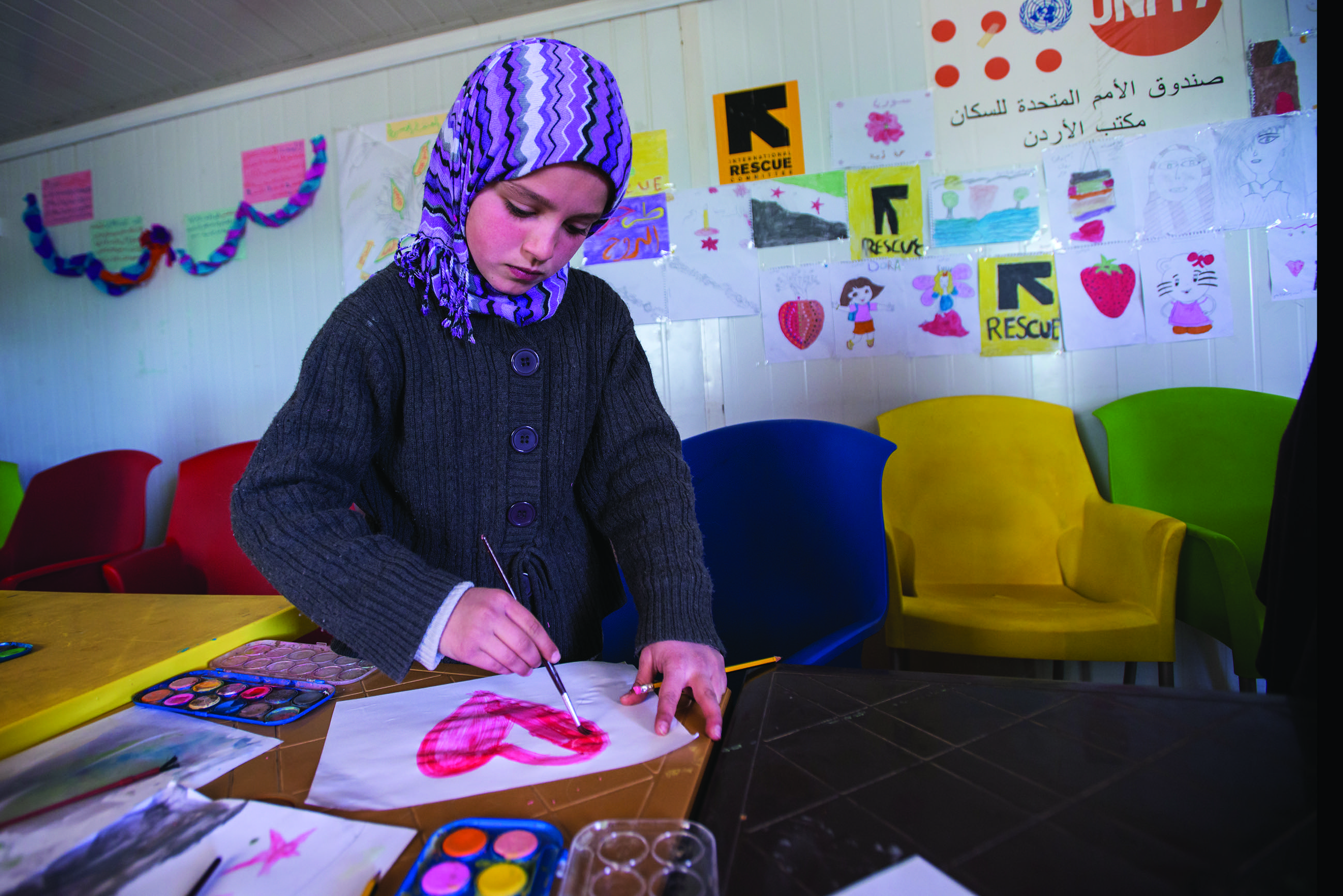 Cash assistance to mitigate risks
Cash assistance to mitigate risks
Sexual exploitation, early and forced marriages and unprecedented levels of domestic violence were identified by women and girls, as well as men and boys, as triggered by lack of economic means and opportunities for women and girls. In response and following IRC safety audits and community based safety planning, cash assistance was identified as a response to reduce multiple risks for women and girls. IRCs cash assistance programme, which uses ATM bankcards, provides families up to 120 Jordanian Dinars per month (about USD $180) for six months. It has benefitted over 2,400 refugee families to date. In addition, over 13,400 “dignity kits” consisting of sanitary napkins, soap and other essential items have been distributed to women and girls of reproductive age. During the winter months, specialized kits are provided to help vulnerable families make it through sub-zero temperatures.
Supporting and increasing women and girls’ decision-making power and their access to, and control over, economic resources are a key aspect of IRC’s prevention efforts particularly in urban settings. This material and financial support mitigates and aims to contribute to reducing the risk of domestic violence, sexual and other forms of exploitation as well as other harmful coping mechanisms. Given the current challenges facing Syrian women and girls economic activities alone – without giving due attention to protective mechanisms – can create additional violence if men feel threatened by women’s new economic status, and if women are expected to manage sums of money that may put them at risk in the community without support on how to safely do so. Supporting women to access and control money therefore provides an important part safety measure and the experience shows risks can be addressed through partnership with women and informed programmes7. Participating in social and economic activities creates protective mechanisms for women and girls – allowing them to rebuild social connections and networks that have been severed because of conflict. Women and girls networks gives them a rare space and opportunity to talk amongst themselves – without supervision or control from others in their lives - about their specific issues and problems, and often serves as a place of support and healing. In addition, expanding economic opportunities can be a protective factor as it allows women and girls to avoid harmful economic activities leading to sexual exploitation.
.jpeg?w=225) Conclusions
Conclusions
The international community has been promising for years to bring the interests of women and girls from the margins of service provision to the mainstream of humanitarian programming. An apparent and understandable sense of hopelessness is setting in for many Syrian women and girls as we fail to act. Critically, for women and girls the need is for immediate action not only to make women and girls safe from exploitation and abuse, but empowered to be active participants in their homes, communities and their own lives. The humanitarian community’s will to prioritize the needs of women and girls in both word and deed is the most critical key to success as we are all accountable for bringing women and girls from the margins of service provision to the mainstream of humanitarian programming. Women and girls’ voices must be a key force in driving humanitarian action. UN agencies, non-governmental organisations, host and donor governments must seek out and value women and girls’ perspectives across all services and be held accountable for applying the minimum standards as laid out in the Interagency Guidelines for the Prevention and Response to GBV.
For more information, contact: Melanie Megevand, email: melanie.megevand@rescue.org
1 We Just Keep Silent – Gender-based violence amongst Syrian refugees in the Kurdistan Region of Iraq, UN WOMEN (April 2014) http://uniraq.org/images/documents/We Just Keep Silent final English.pdf?
2 See the Syria Regional Refugee Response Inter-Agency Regional Sharing Portal. http://data.unhcr.org/syrianrefugees/settlement.php?id=176
3 We Just Keep Silent – Gender-based violence amongst Syrian refugees in the Kurdistan Region of Iraq, UN WOMEN (April 2014) http://uniraq.org/images/documents/We Just Keep Silent final English.pdf
4 This information comes from the Gender-based Violence IMS using the Gender-based Violence IMS Classification Tool, which consists of six types of gender-based violence, their definitions, and a standardized approach for classifying incidents.
5 See International Centre for Research on Women. Child Marriage Facts and Figures http://www.icrw.org/child-marriage-facts-and-figures.
6 See International Centre for Research on Women. Child Marriage Facts and Figures http://www.icrw.org/child-marriage-facts-and-figures.
7 IRC Gender discussion research brief: http://gbvresponders.org/empowerment/eae-evidence/
Economic household discussion group tools - http://gbvresponders.org/empowerment/eae-tools-resources/


